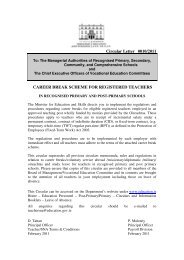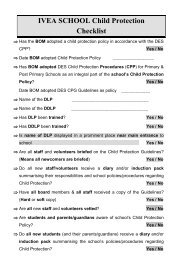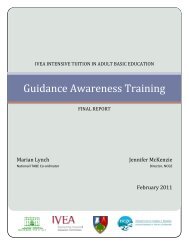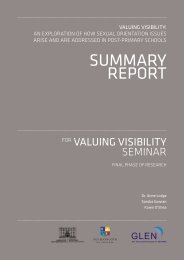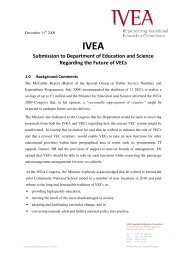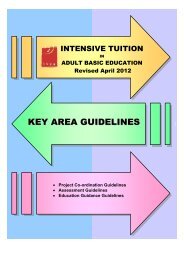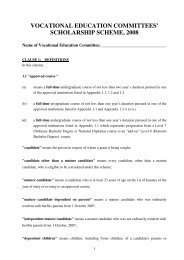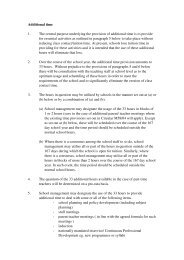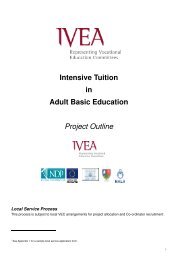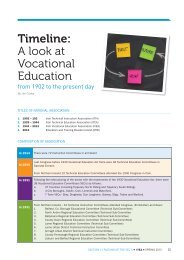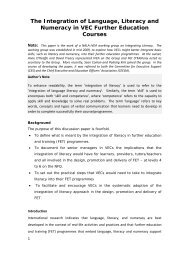Download File - IVEA
Download File - IVEA
Download File - IVEA
Create successful ePaper yourself
Turn your PDF publications into a flip-book with our unique Google optimized e-Paper software.
In co-operation with the Equality Authority, the DES has launched anew document promoting the Equal Status Act, 2000 in schools 22 .Recognising that major challenges still exist for education, thedocument notes inclusion in mainstream education involves not onlyequality of access and participation but also ‘equality of outcome’.Taking account of and valuing difference, an inclusive schoolconsiders how decisions will impact on the student body across thenine grounds 23 . In moving towards an inclusive school, it advisesequality should be promoted in: (1) The school development plan; (2)the admission policy; (3) the code of behaviour; (4) building awareness/understanding; and (5) training [refer to section 4.2].(c) Vocational Education (Amendment) Act, 2001The Vocational Education (Amendment) Act, 2001 confers onVocational Education Committees the role of policy making. TheChief Executive Officer and VEC staff are required to implementVEC policy. It is envisaged that all VECs will adopt the present <strong>IVEA</strong>framework as part of their overall Further Education policy.(d) Disability LegislationLearners who are identified as having a disability as defined bySection 2 of the Education Act, 1998 and Section 2 of the EqualStatus Act, 2000 are entitled to the same level of assistance andsupport as any other student. Education providers, therefore, mustensure that appropriate supports are made available to them. In thiscontext, education providers must be aware of the provisions relatingto disability in these Acts and the anti-discrimination provisionsin Section 4 of the Equal Status Act, 2000. Dedicated legislationcatering for adults with disabilities is expected to be drafted in thenear future.3.2 POLICY FRAMEWORK3.2.1 IntroductionThe Government White Paper on Adult Education – Learning for Life(2000) represents an important new departure in education policy inIreland. The White Paper seeks to accommodate difference based onthree central principles:1) Lifelong learning as a systemic approach;2) Equality;3) Interculturalism.3.2.2 Lifelong Learning as aSystemic ApproachLifelong learning, as defined in the White Paper, refers to adultlearning in a multiplicity of sites including schools, conventionaleducation institutes, training centres, homes and community groups.It also requires ease of movement and progression betweenlearning sites based on parity of esteem between providers;the development of methods of assessment of learningindependently of the context in which such learning occurs;the need to provide the requisite infra-structural supports tothe learner in the form of guidance and counselling; theprovision of childcare and transport and appropriatemechanisms of accreditation and assessment 24 .This has particular significance for asylum seekers and refugees.They are a group of learners who regularly attend programmes in amultiplicity of learning sites, most of which are in community basedsettings. These initiatives are often crucial to ensure participation byindividuals who may not be able to attend mainstream institutionse.g. cultural constraints and lack of childcare facilities can bedetermining factors in participation. Community based learningrequires considerable co-ordination and support. The White Paperfurther recognises the necessity of tackling education disadvantage ina systematic way and states that lifelong learning encompasses theindividual’s education from “the cradle to the grave” 25 .3.2.3 EqualityA number of tentative steps have been taken by the Irish Governmentto accommodate an intercultural and diverse Ireland. The ratificationof EU Treaties and Directives, the Good Friday Agreement andthe Partnership Agreement, Sustaining Progress, 2002 set thecontext for new initiatives in all sectors including education. Recentlegislation, such as the Employment Equality Act, 1998 prohibitsdiscrimination on the grounds of gender, marital status, family status,sexual orientation, religion, age, disability, race, and membership ofthe traveller community. The Equal Status Act, 2000, further prohibitsdiscrimination (with certain exceptions) regarding access to educationon these nine grounds. The White Paper on Adult Education, 2000marks the first time the DES has made a pledge to promote equalityin all sectors of education. For example, there has been an allocationof IR£19.6m (24.9m) for several equality initiatives.21Equality Authority/DES. (2003) Schools & the Equal Status Act, 2000, Equality Authority: Dublin, p. 6.22Ibid.23Ibid, p.824Departmentof Education and Science White Paper on Adult Education Learning for Life, 2000: 32.25Ibid: 30.15



